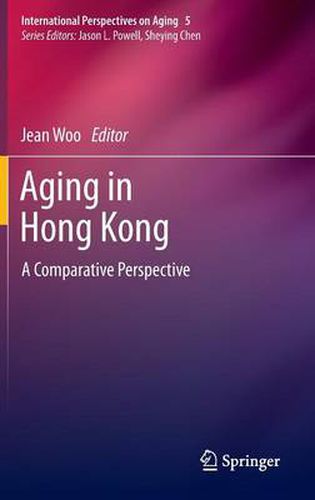Readings Newsletter
Become a Readings Member to make your shopping experience even easier.
Sign in or sign up for free!
You’re not far away from qualifying for FREE standard shipping within Australia
You’ve qualified for FREE standard shipping within Australia
The cart is loading…






This title is printed to order. This book may have been self-published. If so, we cannot guarantee the quality of the content. In the main most books will have gone through the editing process however some may not. We therefore suggest that you be aware of this before ordering this book. If in doubt check either the author or publisher’s details as we are unable to accept any returns unless they are faulty. Please contact us if you have any questions.
With the longest life expectancy for men and the second longest for women, Hong Kong typifies our planet’s aging population. The daily lives of its older adults closely match the advantages and disadvantages experienced by urban elders in other developed countries. For these reasons, Hong Kong’s elderly serve as a salient guide to older people’s social, psychological, and healthcare needs-concerns of increasing importance as the world grows older.
Aging in Hong Kong examines this emblematic population as a case study specifically in comparison with their counterparts in the West, shedding light on diverse, interrelated currents in the aging experience. Referencing numerous international studies, the book contrasts different health service arrangements and social factors and relates them to a variety of health outcomes. Its wide-ranging coverage documents health and illness trends, reviews age-friendly policy initiatives, relates health literacy to patients’ active role in their own care, and discusses elders as an underserved group in the division of limited health funding and resources. This multiple focus draws readers’ attention to policies that need revisiting or retooling as chapters analyze major life areas including:
Living environment. Retirement and post-retirement employment issues. Financial asset management. Health literacy regarding aging issues. Elder-positive service delivery models. Ageism in the prioritization of healthcare. End-of-life issues.
By assembling such a wealth of data on its subject, Aging in Hong Kong puts ongoing challenges into clear focus for gerontologists, sociologists, health and cross-cultural psychologists, public health policymakers, and others involved in improving the quality of elders’ lives.
$9.00 standard shipping within Australia
FREE standard shipping within Australia for orders over $100.00
Express & International shipping calculated at checkout
This title is printed to order. This book may have been self-published. If so, we cannot guarantee the quality of the content. In the main most books will have gone through the editing process however some may not. We therefore suggest that you be aware of this before ordering this book. If in doubt check either the author or publisher’s details as we are unable to accept any returns unless they are faulty. Please contact us if you have any questions.
With the longest life expectancy for men and the second longest for women, Hong Kong typifies our planet’s aging population. The daily lives of its older adults closely match the advantages and disadvantages experienced by urban elders in other developed countries. For these reasons, Hong Kong’s elderly serve as a salient guide to older people’s social, psychological, and healthcare needs-concerns of increasing importance as the world grows older.
Aging in Hong Kong examines this emblematic population as a case study specifically in comparison with their counterparts in the West, shedding light on diverse, interrelated currents in the aging experience. Referencing numerous international studies, the book contrasts different health service arrangements and social factors and relates them to a variety of health outcomes. Its wide-ranging coverage documents health and illness trends, reviews age-friendly policy initiatives, relates health literacy to patients’ active role in their own care, and discusses elders as an underserved group in the division of limited health funding and resources. This multiple focus draws readers’ attention to policies that need revisiting or retooling as chapters analyze major life areas including:
Living environment. Retirement and post-retirement employment issues. Financial asset management. Health literacy regarding aging issues. Elder-positive service delivery models. Ageism in the prioritization of healthcare. End-of-life issues.
By assembling such a wealth of data on its subject, Aging in Hong Kong puts ongoing challenges into clear focus for gerontologists, sociologists, health and cross-cultural psychologists, public health policymakers, and others involved in improving the quality of elders’ lives.